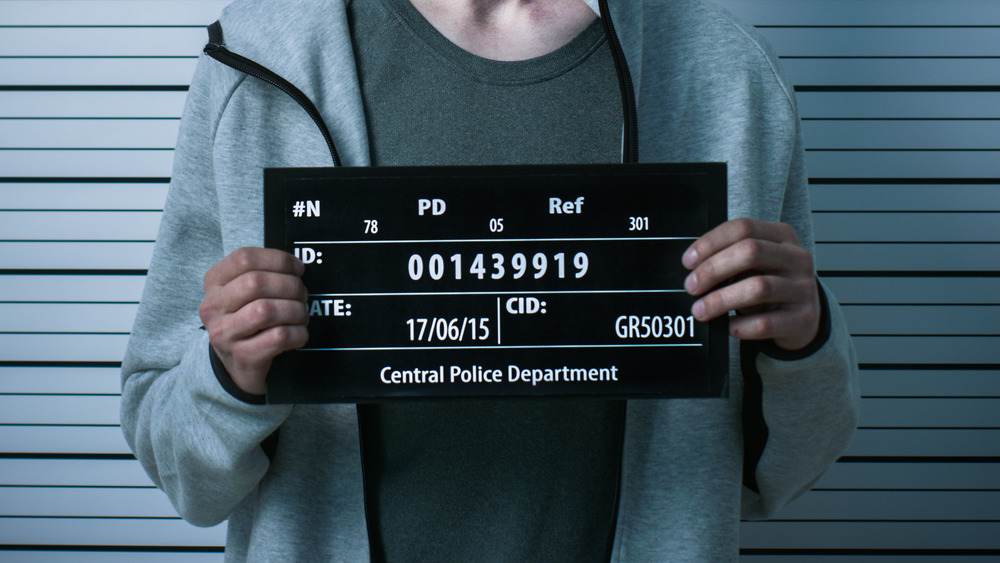How A Fake CIA Agent Convinced People To Rob Banks
Cons and heists are familiar, even comforting, Hollywood tropes that tend to be jazzed up with snazzy music, briefcases dangling from hands, climactic montages of success, and plenty of slick dudes in suits. The Ocean's series, Catch Me if You Can, Matchstick Men, The Sting: these movies portray conmen in a sympathetic, even comical light. They're misunderstood, overly intelligent, and in the end, no matter how the law is circumvented, only those who deserve punishment get punished.
So what if a real-life case came along that combined a conman impersonating a CIA officer, multiple bank heists, and documentation and terminology convincing enough to fake out the police? Throw in a fall guy in the form of an $11/hour Target employee who got suckered into this nonsense because he wanted to go community college and leave his parents' house.
This was exactly the case in 2013 in Fairfax County, Virginia, when, as Bloomberg tells us, 21-year old Target employee Herson Torres was wrangled into a money-making scheme via friend Carolina Villegas, who also worked in retail. Villegas was a victim, too, conned into bringing in Torres, promised fake future employment. For his part, Torres himself was offered $25,000 as a reward, and the two of them wound up at the center of an absolutely bananas case of no-holds-barred, doubled-down trolling and/or psychiatric episode perpetrated by one Joshua Brady, a 26-year old MMORPG player and ultra-convincing impersonator of government officials.
A bank-robbing game featuring immunity from prosecution
"Operation Downstrike" is what Brady called it on the phone, using his pseudonym Theo, per Business Insider. He wielded lingo and phrases that inspired confidence, sounded legit, and was consistent with CIA terminology. Rob some banks as part of a government operation to test the defenses of financial institutions in the Washington, D.C. area, he asked. Here's a letter on Defense Intelligence Agency (DIA) letterhead guaranteeing "civilian volunteers" immunity from "civil and criminal action." Here's a fax from a fake doctor to get you off of work tomorrow. Just walk into the bank with a note and silently hand it over. If guards show up, or if the cops are alerted, leave. Deliver the money via dead drop near Richmond. Earn $25,000 if you succeed, and $2,500 if you don't.
Sounds almost like a game, doesn't it? A game extra appealing to individuals seeking direction in life, such as Torres and Villegas. A game where Villegas acted as go-between for Theo and Torres, and unknown to Torres, was promised a government job on completion of the operation.
And so Torres walked into SunTrust in Alexandria, Virginia, with a note saying, "I need your help. I need money. My family is being held hostage and a bomb will go off at 4:30 if you don't help. Don't call the police or the FBI." The manager couldn't help without calling the police, he said, and Torres just walked out the front door.
A string of failed robbery attempts and an inevitable arrest
After SunTrust, as Huffington Post recounts, Torres went to Capital One, and the next day to bank after bank along the Capital Beltway. Each attempt failed. Theo was on the phone the entire time, instructing, consoling, promising to "get the helicopter off your back," lying to police, saying "I'm going to fix that" regarding Torres's face being on camera, providing additional fake documentation, asking for more friends to be recruited for bigger, more complex jobs.
Torres, Villegas, and eventually Torres's friend, cousin, and brother-in-law failed time and again at their robberies, and somehow, weren't caught. That is, until they returned to a bank they had previously tried, a BB&T, for one more shot. That time, the manager recognized them as the "inexperienced" robbers from before, in baseball caps and hoodies in hot weather, and without a bag for carrying money. They fled the bank and into their Honda Civic as police screeched into the parking lot. Theo told them to hide out, and several hours later sent a text saying, "You're in the clear." This was on a Friday, and by the following Tuesday police burst into Torres's house and arrested him.
Torres told his story to the cops, who were totally incredulous, but ended up believing that Torres might in fact have been manipulated. It helped that Torres cooperated, showing them text messages, giving them access to his Facebook account, and handing over the fraudulent documents from the "CIA."
A con perpetrated from a living room computer
At this point the police contacted Theo, who doubled down on his story that he was in charge of Operation Downstrike, tasked to conduct sanctioned intelligence operations for the CIA. He was so convincing on the phone that he even confused one of Torres' defense attorneys, David Dischley, hired by Theo for $45,000 cash. Dischley, an ex-Marine with a background in intelligence, said, "the logic behind it made a little bit of sense." At the same time, Theo made strange demands like refusing to pass through a metal detector for a scheduled meeting with police (for which he never showed up). He also slipped in a couple hokey lines such as, "You can't make people disappear — only we can." Perhaps the biggest, most glaring problem, though? The police are usually the ones who initiate contact with the intelligence community for assistance with security matters. And in this case, they hadn't.
Eventually, Villegas cracked under pressure when talking to the detective in charge, John Vickery. Villegas had met Theo on — are you ready? — sugardaddyforme.com, where he convinced her of the entire scheme. The police eventually tracked down the culprit, real name Joshua Brady, through his IP-address-concealed phone number. Brady, who lived with his mother and grandmother, was found in his house with CIA-related books, several computers, and a bad case of acne.
Home-schooled and diagnosed with several psychological disorders
Even after being apprehended, Brady continued to press the validity of his story, saying, "This was not the kind of operation I wanted to work on." Brady, who had been bullied in high school and left to finish his diploma online, claimed to operate an IT consultancy from home "keeping you free from hackers." He was a CIA employee, he say, shielded by the Intelligence Identities Protection Act, and he couldn't "go into great detail on initial contact or my background."
Ultimately, Brady was charged with impersonating a government official and three counts of attempted bank robbery, as the FBI archives tell us. As it turns out, this wasn't his first run-in with the law, as he was previously caught forging a judge's signature to get out of paying a cell phone bill, and posing as an entrepreneur online in order to steal an Xbox 360. Brady was also caught stealing virtual money on Everquest, an MMORPG that pre-dates World of Warcraft.
Brady's attorneys and doctors said that he had PTSD, paranoid schizophrenia, and schizotypal personality disorder. In the end, his potentially 60+ year sentence was reduced to three years supervision in his mother's house and mental health treatment. Torres, Villegas, and their friends were all released without any charges, on the grounds that they'd been duped.
A mere month later, as the Richmond Times tell us, Brady was caught impersonating a Homeland Security Officer under the name Jacob Attlinger.




